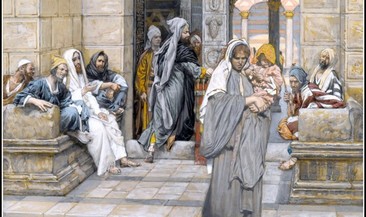
Family can be a very mixed bag; good for some, not so good for others. Ideally, family represents a special place of acceptance, belonging, support, love, and grace. The boundaries of "family" get stretched in today's scriptures in ways that teach us hard truths. We're called to transform the bounds of family into the bonds of family.
In the story from the Book of Ruth, we see how the standards of society in biblical times worked for women. Not so good, if you were wondering. Naomi and here daughters-in-law suddenly find themselves alone. Tradition dictates a return to "family," to one's own "people" for women in such a predicament.
Naomi is headed back to Bethlehem in Judah to her "people," and she urges her daughters-in-law to return to their "people," the Moabites. One daughter-in-law, Orpah, reluctantly returned to her family, but the other, Ruth, refused, pledging herself to Namoi, to Naomi's people, to Naomi's path, and to Naomi's God.
As they return to Bethlehem, Ruth discovers the gracious and generous extension of care, hospitality, and generosity from Boaz, the owner of a field where she is gleaning behind the harvesting reapers. Although not one of his "people," Boaz treats Ruth in a way that regards her as "family," expanding the narrow notion that would traditionally prevail. It would have been expected that he regard her with indifference, but he didn't.
In Mark 12, Jesus begins by condemning the ostentatious, overbearing, and fundamentally useless teachers of the Law who have high self-regard, see themselves as definers of righteousness, and who disregard the real needs of God's people, preferring to narrowly define belonging according to distorted and corrupt views of God's will in the Law.
Then, being in the Temple, Jesus and his disciples take in the show by the collection box where donors place their gifts. The large gifts of the wealthy get plenty of attention. Jesus is likely annoyed by his own disciples being enrapt by these hefty gifts. When a widow drops in her two coins, Jesus seizes the moment to provide a lesson in genuine faithfulness.
Behind his praise of the widow is also a condemnation of the wealthy and the religious leaders who are indifferent to the needs of those who are truly faithful. In Jesus' day as in ours, the system pays its best attention to those who have power and wealth, and holds the weak, poor, and vulnerable in contempt, seeing their condition as a result of their own personal failings as well as divine condemnation for their apparent sinfulness.
Jesus wants to remind his audience of their family connections, that the family of God's faithful must care for the widow and others in society like her, for such people are brothers and sisters in the eyes of God. When God's truly faithful are doing what family does, being supportive, encouraging, concerned, compassionate, forgiving, and nurturing as well as loving, then the gospel of new life in Jesus has been heard, received, and acted upon.
To get the full scoop, check out the sermon video below, and note the downloads available below the video panel.
In the story from the Book of Ruth, we see how the standards of society in biblical times worked for women. Not so good, if you were wondering. Naomi and here daughters-in-law suddenly find themselves alone. Tradition dictates a return to "family," to one's own "people" for women in such a predicament.
Naomi is headed back to Bethlehem in Judah to her "people," and she urges her daughters-in-law to return to their "people," the Moabites. One daughter-in-law, Orpah, reluctantly returned to her family, but the other, Ruth, refused, pledging herself to Namoi, to Naomi's people, to Naomi's path, and to Naomi's God.
As they return to Bethlehem, Ruth discovers the gracious and generous extension of care, hospitality, and generosity from Boaz, the owner of a field where she is gleaning behind the harvesting reapers. Although not one of his "people," Boaz treats Ruth in a way that regards her as "family," expanding the narrow notion that would traditionally prevail. It would have been expected that he regard her with indifference, but he didn't.
In Mark 12, Jesus begins by condemning the ostentatious, overbearing, and fundamentally useless teachers of the Law who have high self-regard, see themselves as definers of righteousness, and who disregard the real needs of God's people, preferring to narrowly define belonging according to distorted and corrupt views of God's will in the Law.
Then, being in the Temple, Jesus and his disciples take in the show by the collection box where donors place their gifts. The large gifts of the wealthy get plenty of attention. Jesus is likely annoyed by his own disciples being enrapt by these hefty gifts. When a widow drops in her two coins, Jesus seizes the moment to provide a lesson in genuine faithfulness.
Behind his praise of the widow is also a condemnation of the wealthy and the religious leaders who are indifferent to the needs of those who are truly faithful. In Jesus' day as in ours, the system pays its best attention to those who have power and wealth, and holds the weak, poor, and vulnerable in contempt, seeing their condition as a result of their own personal failings as well as divine condemnation for their apparent sinfulness.
Jesus wants to remind his audience of their family connections, that the family of God's faithful must care for the widow and others in society like her, for such people are brothers and sisters in the eyes of God. When God's truly faithful are doing what family does, being supportive, encouraging, concerned, compassionate, forgiving, and nurturing as well as loving, then the gospel of new life in Jesus has been heard, received, and acted upon.
To get the full scoop, check out the sermon video below, and note the downloads available below the video panel.
| 11-08-15-ff-answers.pdf |
| 11-08-15-doing_what_family_does.pdf |
